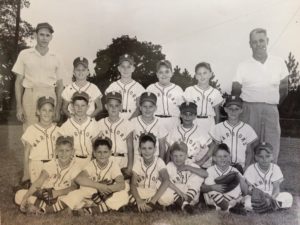During Lent I have been reading Parker Palmer’s On the Brink of Everything: Grace, Gravity, and Getting Old. Early in the book Parker quotes St. Benedict, “Daily keep your death before your eyes.” This may sound like morbid advice, but the intention is anything but morbid. We are admonished to remember our impermanence and the impermanence of others. This awareness, that all we know and all we love will someday be gone, can either debilitate us or enliven us. The goal is to enliven us. Knowing the clock is running down can focus our energy and purpose.
The longer we live, the more we say “Good bye.” That’s been brought home to me more and more frequently. Any of us who have walked the earth for more than a few decades has a growing list of losses.
 For example, I learned about a year ago that my best friend from elementary school, Steve, had died of heart disease. (He’s on the top row, second player from the right). I got the news when I called to arrange a dinner with him during an upcoming trip through East Texas. We had reconnected after losing contact almost 60 years ago and I was hoping this would be our chance to make up for lost time. Opportunity lost.
For example, I learned about a year ago that my best friend from elementary school, Steve, had died of heart disease. (He’s on the top row, second player from the right). I got the news when I called to arrange a dinner with him during an upcoming trip through East Texas. We had reconnected after losing contact almost 60 years ago and I was hoping this would be our chance to make up for lost time. Opportunity lost.
Last month I learned that my best friend from high school had died. A post I wrote yesterday highlighted the death of my friend, Ray, one year ago. I’ve lost friends from every era of my life, and the list is getting longer. Friends we grew up with, parents of friends who helped raise us, teachers and mentors, and people in our families who were once a daily part of our lives, now gone. Each one takes something of us with them, and leaves something of themselves behind for us to cherish.
Death is the natural end of physical life. It is inevitable. Awareness of our impending death is a choice. We can remember to “daily keep your death before your eyes” and allow that awareness to provide focus and direction to our moments and our relationships, or we can turn our heads and pretend that it will not happen to us and to those we love.
0 Comments until now
Add your Comment!